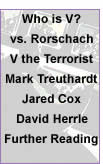It's interesting to note just how many similarities V and Rorschach share. The most obvious being that they both wear masks. This is a standard trope of the super-hero genre, but unlike most super-hero masks that hide a person's identity, Moore specifically chose the masks of V and Rorschach to be the physical representation of their personalities. For Rorschach, the shifting splotches of black on white represent the chaos he sees, patterns that have no meaning expect what someone thinks they have. Meanwhile, V assumes the guise of Guy Fawkes, a four hundred year old symbol of rebellion, violence, and revolution that V brings to the present.
Furthermore, both V and Rorschach are identities that have superceded the ones these men first were. Rorschach is not Walter Kovacs, a fact Rorschach makes clear during his sessions with Dr. Long. Rorschach is a being who understands the horror found in the world, a horror Kovacs could neither fully understand or accept. Once Kovacs understood this truth, he retreated. "It was Kovacs who said 'mother' then . . . It was Kovacs who closed his eyes. It was Rorschach that opened them again" (Watchmen, chapter VI, page 21). Once Rorschach came into being, Kovacs, the person, ceased to exist.
V was born much the same way. No one knows who V was before he wore his mask. Finch notes that with no records kept from the concentration camps, it is impossible to know who V was before his experimentation; what his age was, his ethnicity (Vendetta pages 79-86). V has no other identity but V. V escaped the Larkhill Resettlement Camp, but the person V was prior did not. Despite the fact that both men wear masks, neither have an identity beyond them. The implication that Moore is making, is that when it comes to a persons identity, who you are is not as important as what you are.
One more interesting similarity between V and Rorschach: both are people whose convictions are formed with the help of women neither character meet. In Rorschach's case it is the fates of Kitty Genovese and Blaire Roche that drives him. For V it is Valerie and her autobiography. It's curious that in both cases, these women suffer horrible deaths--Kitty and Blaire are sexually assaulted and murdered, while Valerie is tortured and experimented upon to death. Yet by dying, they become martyrs to the causes that inspire V and Rorschach. The misogynistic undercurrent is noticeable, but it's hard to tell whether that is the result of the writer's personal feelings or a broader social commentary. Regardless, it is the tragedies of these women that bring about a catharsis in V and Rorschach, driving them to their own respective fates.
But it is here that V and Rorschach begin to diverge. For Rorschach is driven by the dark cruelties of life while V becomes inspired and goes about making the world better than it currently is.
Rorschach claims that he is railing against the darkness, but the truth is he is consumed by it. He is paranoid and masochistic. He beats up the murderers, the pimps, the drug dealers, but that doesn't stop them from appearing. As far as Rorschach's concerned, they just get worse, and he yearns for a time when things were better. In fact, he is almost blinded by nostalgia. Note how the story starts off stating that it is 1985 but Rorschach is nostalgic for Harry Truman-an era thirty years prior. Rorschach may understand the world, but he fails to realize he is a part of it, not outside of it like he thinks. Furthermore, Rorschach is also completely ineffective in his goals. Though his paranoia made him correct in assuming there was something sinister in Ed Blake's murder, he had no clue what was really going on. When he and Dreiberg physically confront Adrian Veidt, Veidt wipes the floor with him. Ultimately, Rorschach supports the status-quo. Instead of actually changing anything, he picks at the little vermin below him. As Veidt boastfully points out: his only success is failing to doom the world. Rorschach is a product of his world: pessimistic, self-centered, stubborn, paranoid. He has seen the darkness of existence and has become swallowed up by it.
V, by contrast, rejects the darkness. Where Rorschach has given up hope, V instills it. Rorschach says "Soon there will be war. Millions will burn. Millions will perish in sickness and misery" (Watchmen Chapter I, page 24). Meanwhile, V grows roses in Valerie's memory, in the hopes that "the world turns and that things get better" (page 160). V works to bring about this very notion, working to improve the world, to end the reasons that caused Valerie, himself, and others, to be sent to camps to die. He successfully incites the populace to rise up against its rulers. Thus V succeeds where Rorschach fails: V does save the world.
This dichotomy is best summered up when V says "there are no coincidences, only the illusion of coincidence" (page 74). V does not believe in randomness or chance. V's actions are surgically precise, as opposed to Rorschach's futile investigations. V's plans have been composed in methodical, intricate detail, beginning long before he first made himself known to Norsefire. Almost nothing happens within the novel that V did not expect. V, literally, controls Fate.
As Watchemn and V for Vendetta both started as super-hero comics that became more than the sum of their parts, so did Rorschach and V become characters of more depth beyond their super-hero-vigilante beginnings. But while Watchmen's deconstruction necessitated that Rorschach's character remain trapped by his limitations, the lack of deconstruction in Vendetta allowed Moore to take V on to a higher plateau than super-heroes could reach. Vendetta itself could be about change, could allow change. This freedom--both in terms of story-telling and in the truest sense of the word--is what enables V to succeed where Rorschach fails.



